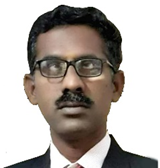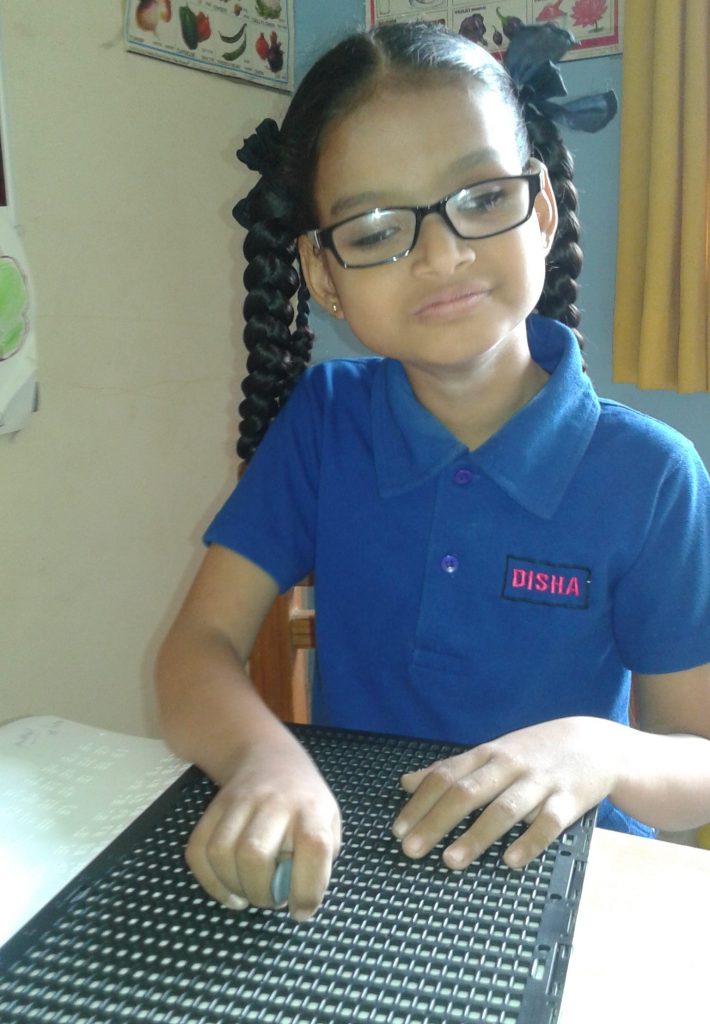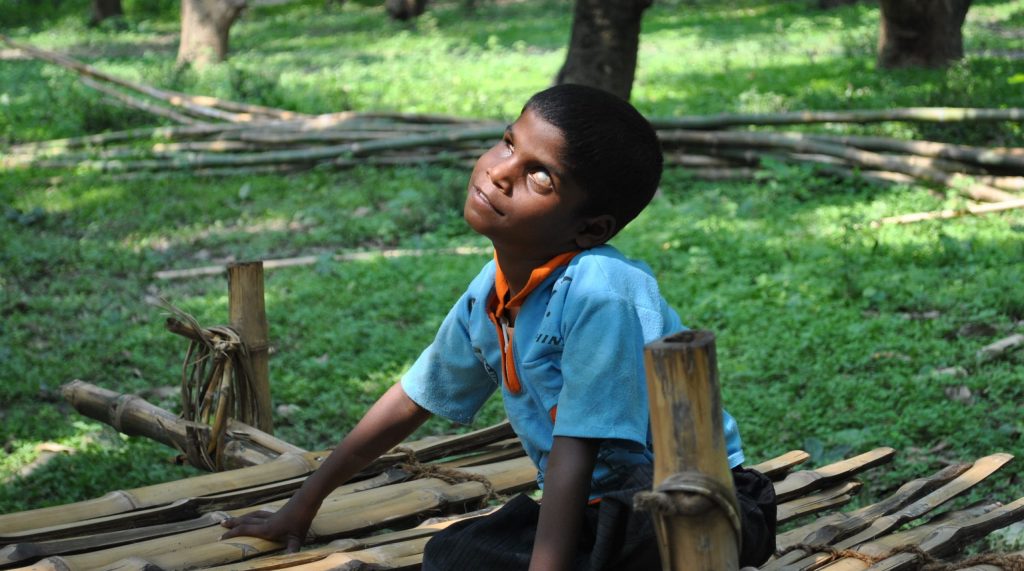

Ninety-five per cent of what we learn is through our eyes and ears. Visualise what life is like for a person who cannot see and hear. Deafblindness is “a condition in which a person may have a component of hearing and visual impairments causing severe communication, developmental, and educational needs”. There is no scientific study yet on the incidence of deafblindness, but door-to-door surveys in community-based programmes estimate that there are more than 5,00,000 persons with deafblindness in India.
There is no single medical condition that can lead to the unique disability of deafblindness. People can be born deafblind or may acquire it later in life. Those born deafblind because of infection, genetic conditions or birth defects are termed as having congenital deafblindness or early-onset deafblindness, while those who acquire deafblindness later in life because of trauma or accident, genetic syndrome, ageing, or progressive infection are termed as having acquired deafblindness.
We have played a pivotal role in the last 25 years to transform the lives of more than 80,000 children and adults with deafblindness across the country with the help of a network of grassroots organisations. We have a presence in 23 States. Our key objective is to provide information, guidance, support, and training needed along with being committed to helping persons with deafblindness and multiple disabilities and their families by raising awareness and campaigning for rights, opportunities, and services throughout the nation.
Rubella, commonly known as German Measles, leading to Congenital Rubella Syndrome (CRS), is one of the major causes of congenital deafblindness. Individuals who have both hearing and vision loss do not have access to information, and that adversely impacts their learning process. They cannot communicate with their environment in a meaningful way, have a distorted perception of the world, and have extreme difficulty establishing and maintaining interpersonal relationships. They are often mislabeled as intellectually or developmentally disabled or emotionally disturbed. If the child is profoundly deaf and blind, their experience of the world extends only as far as their fingertips can reach. Their concept of the world depends upon what they have had the opportunity to encounter physically.
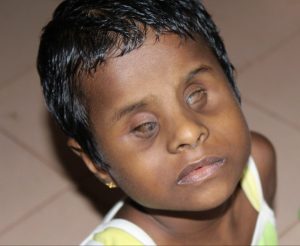 Sense International India (also known as Sense India) is the first and only national-level organisation that provides education and rehabilitation services for people with deafblindness. The right intervention enables them to overcome the challenges and become active members of society. We have played a pivotal role in the last 25 years to transform the lives of more than 80,000 children and adults with deafblindness across the country with the help
Sense International India (also known as Sense India) is the first and only national-level organisation that provides education and rehabilitation services for people with deafblindness. The right intervention enables them to overcome the challenges and become active members of society. We have played a pivotal role in the last 25 years to transform the lives of more than 80,000 children and adults with deafblindness across the country with the help 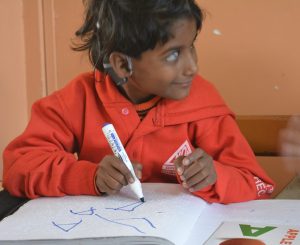 of a network of grassroots organisations. We have a presence in 23 States. Our key objective is to provide information, guidance, support, and training needed along with being committed to helping persons with deafblindness and multiple disabilities and their families by raising awareness and campaigning for rights, opportunities, and services throughout the nation. With the support of our project teams at the grassroots level, we identify persons with deafblindness through surveys, awareness camps and referrals from sensitised stakeholders such as Anganwadi workers, medical practitioners, government/NGO officials, etc.
of a network of grassroots organisations. We have a presence in 23 States. Our key objective is to provide information, guidance, support, and training needed along with being committed to helping persons with deafblindness and multiple disabilities and their families by raising awareness and campaigning for rights, opportunities, and services throughout the nation. With the support of our project teams at the grassroots level, we identify persons with deafblindness through surveys, awareness camps and referrals from sensitised stakeholders such as Anganwadi workers, medical practitioners, government/NGO officials, etc.
Those identified with deafblindness go through detailed functional assessment and clinical vision and hearing assessment to ascertain the extent of impairment and current functional capacity of the person. Based on the assessment, and with the support of the parents, our team makes an intervention plan/individualised education plan (IEP) for the service user specifying short-and long-term goals. To overcome and resolve challenges faced by persons with deafblindness, we provide services through centre and home-based programmes through our partner organisation.
We believe in building an ecosystem to create opportunities and awareness of deafblindness. For this, we organise regular training at local, state, regional and the national level on deafblindness and curriculum adaptations for rehabilitation professionals.
Needs-based Training and Education
We develop skills of children and young adults in activities of daily and independent living such as bathing, clothing, personal grooming, navigation, and mobility skills. Additionally, we provide assistive mobility devices and developmental aids such as a white cane, hearing aid, spectacles, rollator, wheelchair, Braille kit, etc.
We introduce sign language and Braille to children and young adults enrolled in our different projects across India. We teach them by using different tactile materials to develop their communication skills. To ensure two-way communication, we also train caregivers in sign language and guide them with the different modes of communication they can implement with their ward. Our speech therapist also works on improving speech in these children.
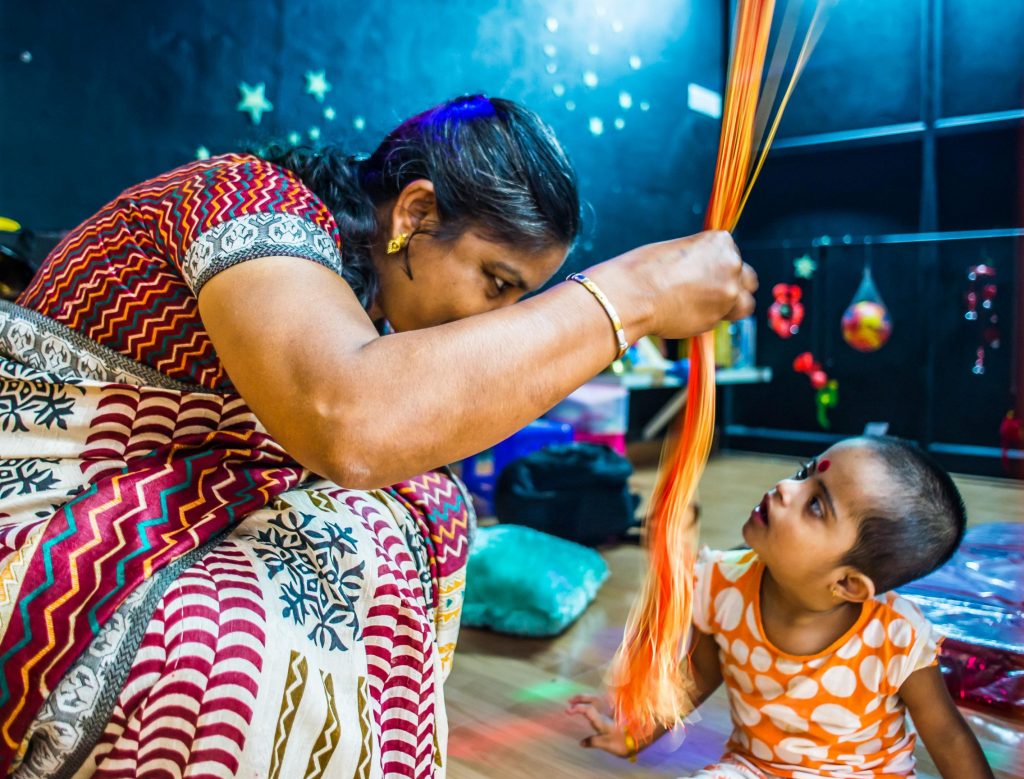
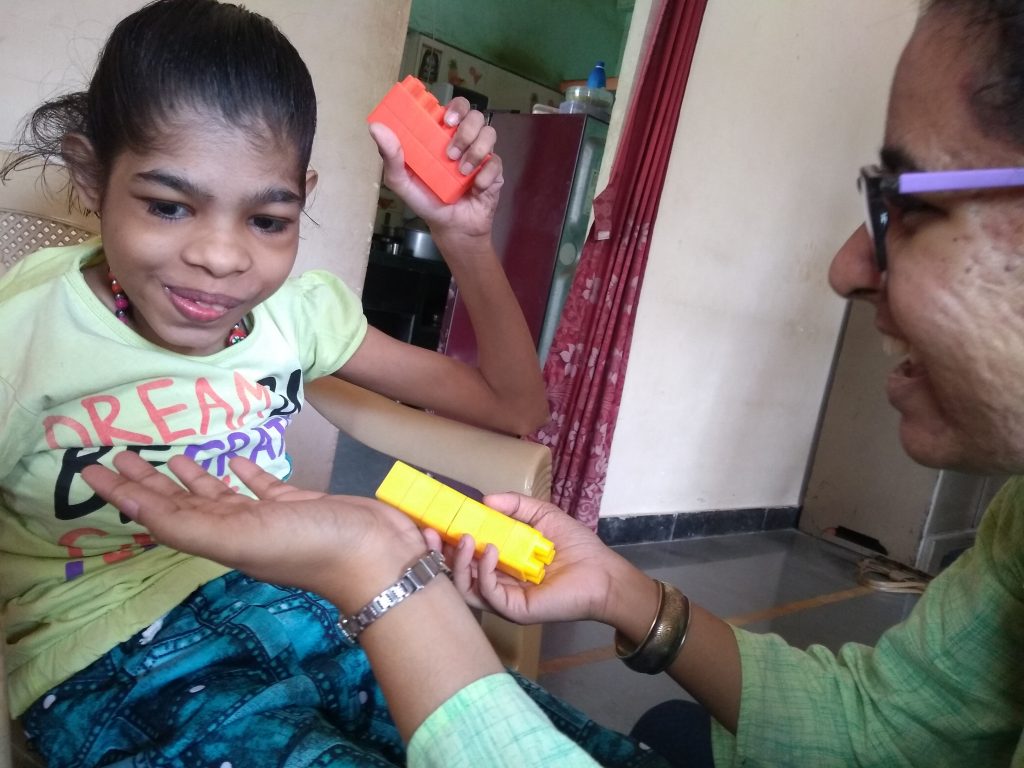
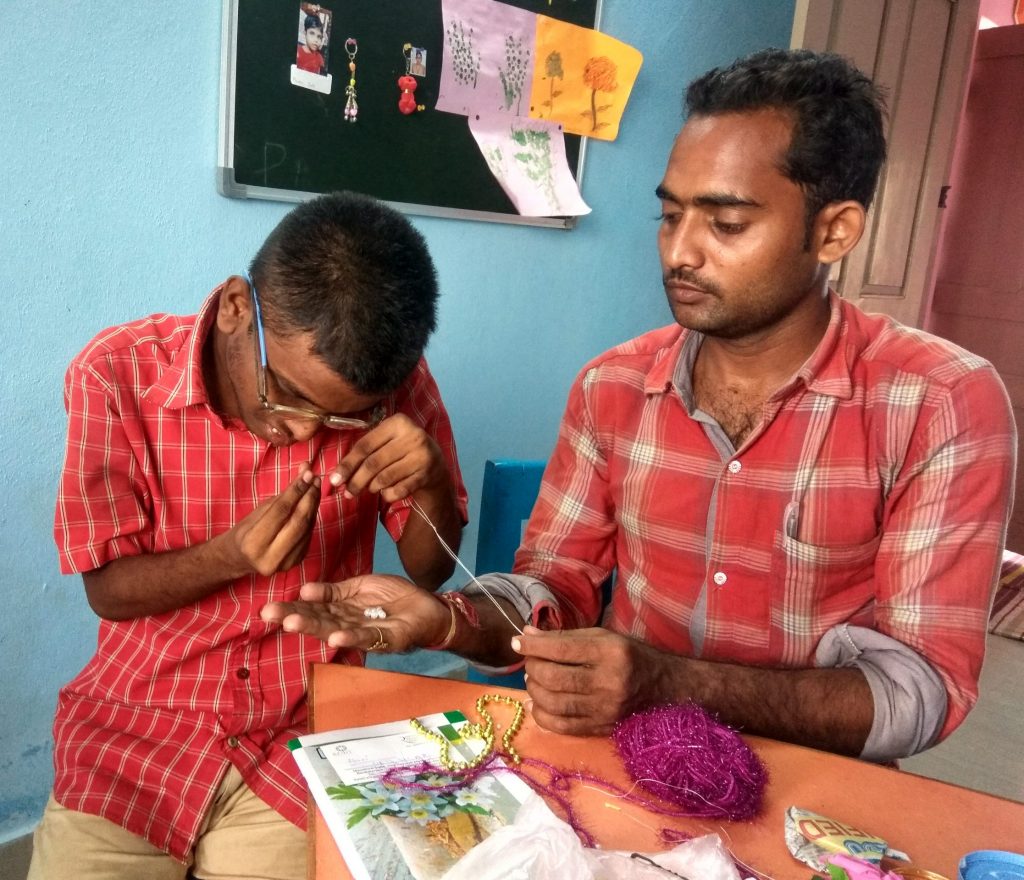
We promote inclusive education for these children. We sensitise caregivers to enrol their children in a formal educational setup after the child acquires basic training and is prepared for formal education. We also train educators from Samagra Siksha as well as school authorities. We also sensitise students without disabilities studying in mainstream schools to promote inclusive and equitable education.
|
|
We organise regular training sessions for medical and paramedical professionals, Samagra Shiksha officials, NGO/government officials and other rehabilitation professionals to identify persons with deafblindness, conduct a proper assessment, refer to appropriate organisations and work better with them.
On a larger platform, we are advocating for the inclusion of persons with deafblindness in every aspect – be it educational inclusion or political inclusion.
We believe in building an ecosystem to create opportunities and awareness of deafblindness. For this, we organise regular training at local, state, regional and the national level on deafblindness and curriculum adaptations for rehabilitation professionals.
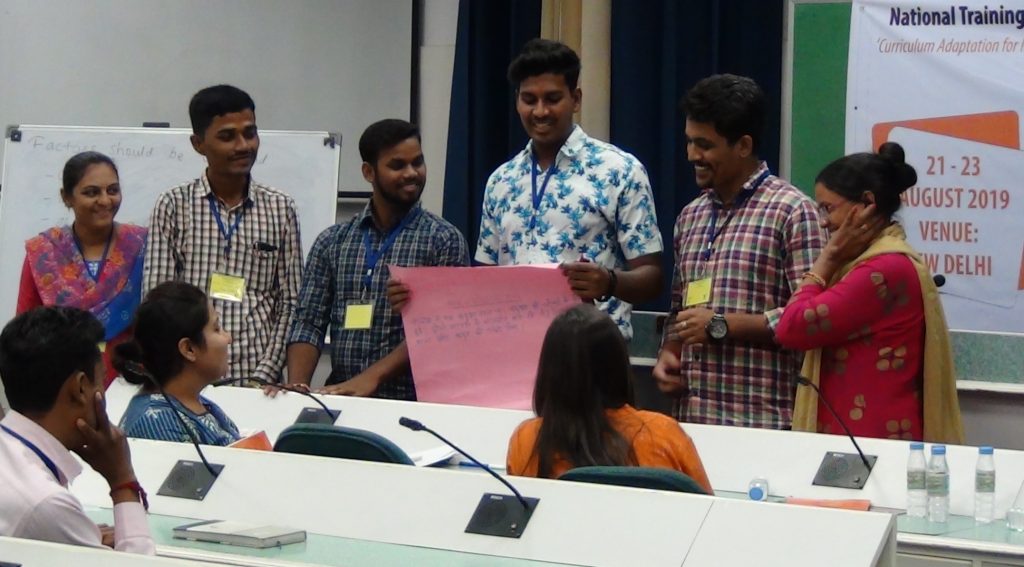
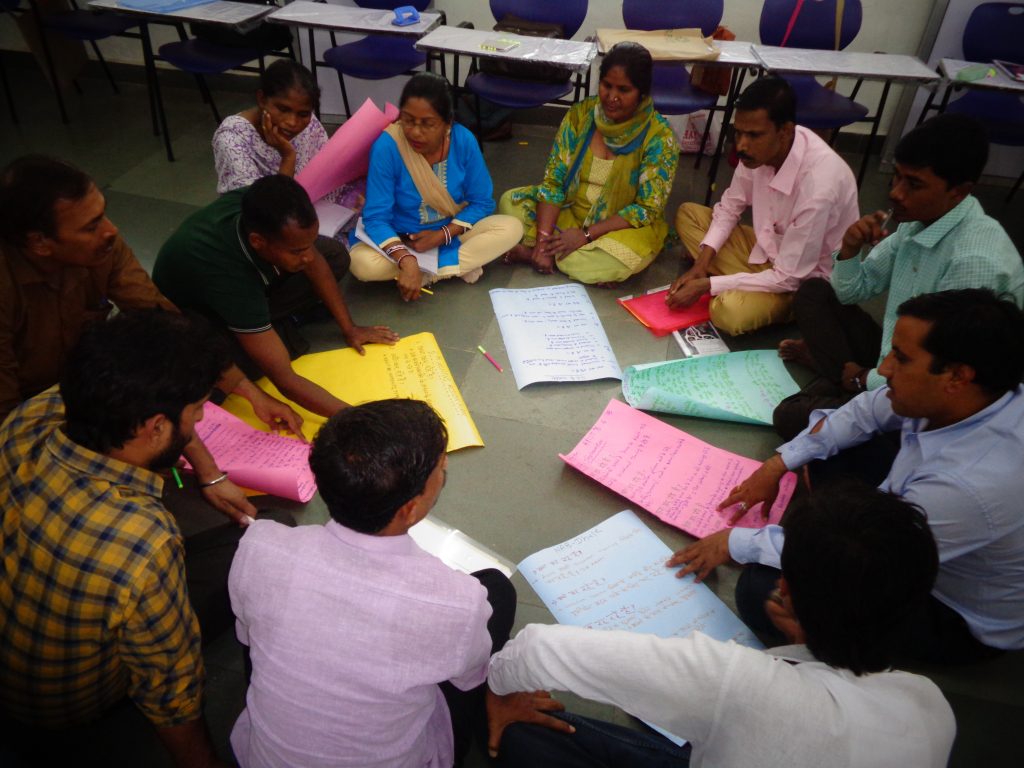
We promote three National Networks – for parents (Prayas), Special Educators (Abhi Prerna), and for young adults (Udaan) that have representatives from across India to share their concerns and achievements and engage with the government for the rights of persons with deafblindness.
Our projects across India provide comprehensive rehabilitation services for persons with deafblindness and multiple disabilities to ensure education, healthcare, livelihoods, and inclusion in mainstream society.
 Deafblind youth receive training in developing vocational skills. We provide vocational training in trades such as making paper bags, office files, candles, chocolates, handicraft items such as toran wall hanging, tie and dye, block-printing, spices packaging, etc. Products made by our vocational trainees are displayed and sold especially during festive exhibitions and fairs. Depending on the skills and severity of the disability, several deafblind adults are supported through Income
Deafblind youth receive training in developing vocational skills. We provide vocational training in trades such as making paper bags, office files, candles, chocolates, handicraft items such as toran wall hanging, tie and dye, block-printing, spices packaging, etc. Products made by our vocational trainees are displayed and sold especially during festive exhibitions and fairs. Depending on the skills and severity of the disability, several deafblind adults are supported through Income 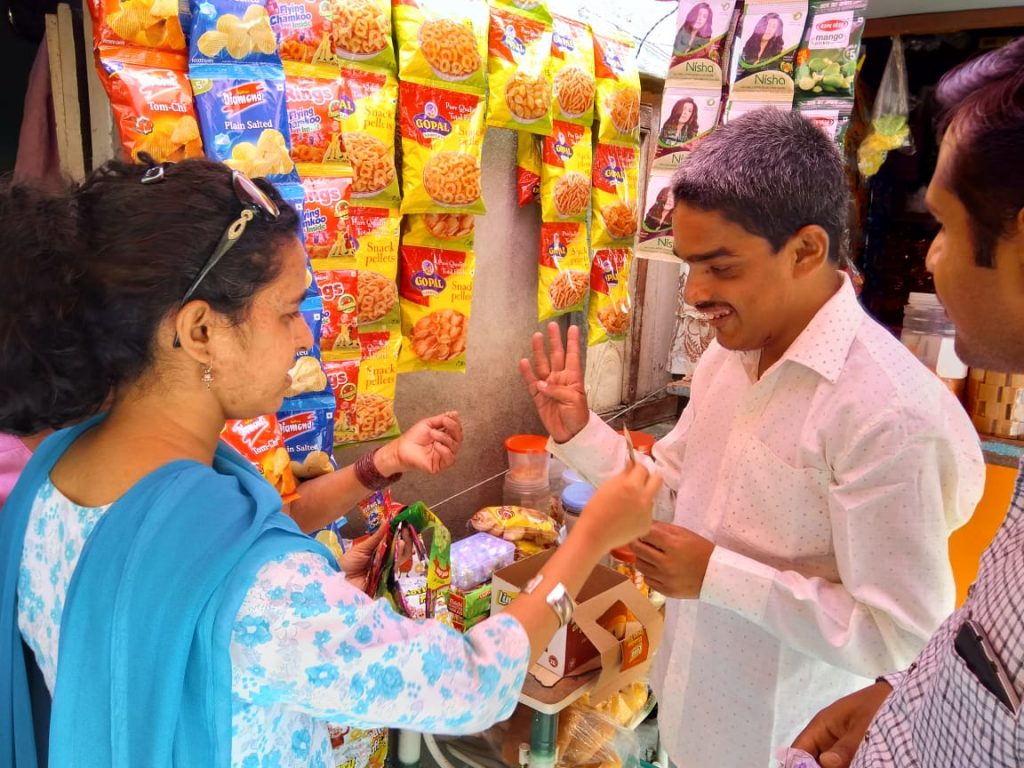 Generation Activities (IGA). Our team provides basic training in soft skills, money concepts and trade-related training to the adults and accepts a business plan from them. We also provide financial support through seed funding to selected adults to initiate their microenterprise. To date, 160 young adults with deafblindness and multiple disabilities have received IGA support and engaged in diverse livelihoods such as goat rearing, operating general stores, mushroom cultivation, cattle rearing, poultry farming, etc.
Generation Activities (IGA). Our team provides basic training in soft skills, money concepts and trade-related training to the adults and accepts a business plan from them. We also provide financial support through seed funding to selected adults to initiate their microenterprise. To date, 160 young adults with deafblindness and multiple disabilities have received IGA support and engaged in diverse livelihoods such as goat rearing, operating general stores, mushroom cultivation, cattle rearing, poultry farming, etc.
|
Our projects across India provide comprehensive rehabilitation services for persons with deafblindness and multiple disabilities to ensure education, healthcare, livelihoods, and inclusion in mainstream society.
The following stakeholders have made a huge difference in the lives of the children and adults under our care by supporting the various projects undertaken all over India.
- Azim Premji Foundation – Kerala, Andhra Pradesh, Telangana, Tamil Nadu, Karnataka, Himachal Pradesh, Uttarakhand and Punjab.
- Kamal India Foundation (KIF) and Kamal Udwadia Foundation (KUF) – Odisha (Bhubaneshwar), Chhattisgarh (Raipur), Jharkhand (Ranchi), West Bengal (Kolkata) and Bihar (Gaya).
- Asha for Education, KHS Machinery and Dharamsi Morarji Chemicals – Gujarat.
- Bajaj Auto Ltd – Pune.
- Microsoft India Ltd. – Delhi.
- The Hans Foundation – Goa.
- Commonwealth Foundation – Spreading awareness on COVID-19 and its adverse impact on persons with deafblindness and multiple disabilities and ensuring they are not excluded from national policy decisions, healthcare and social protection facilities.
- Grand Challenge Canada – Mental health awareness and support to children and young adults with deafblindness and their families.
Our substantial focus is to build the capacity of various stakeholders like persons with deafblindness, their parents and caregivers, special educators, senior professionals, caregivers, teachers from the inclusive education system, medical and paramedical professionals and government officials to identify and understand the needs of people with deafblindness. We provide opportunities to all stakeholders through national, regional, and state-level training/conferences to ensure quality services for people with deafblindness. We also run a three-month web education course on deafblindness and sign language for special educators, caregivers and rehabilitation professionals.
We have come a long way in the past 25 years. We have had plenty of challenges to get this unique disability recognised, support people with deafblindness to access their rights to live a life of dignity and create awareness that deafblindness is not insurmountable. We still must reach out to many more people with deafblindness. Twenty-five years on, we feel that we have just begun. Come with us on this journey to transform lives.
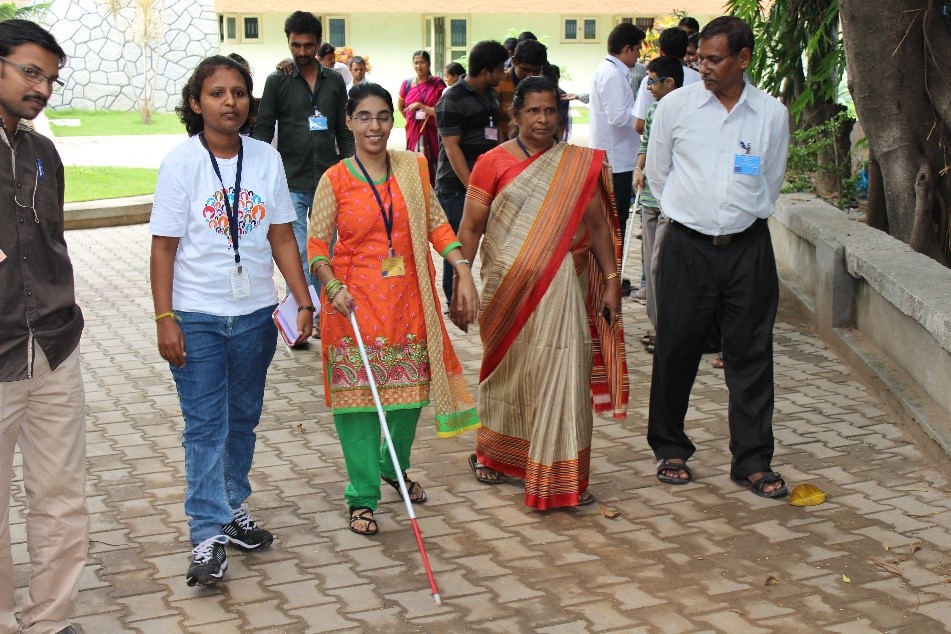
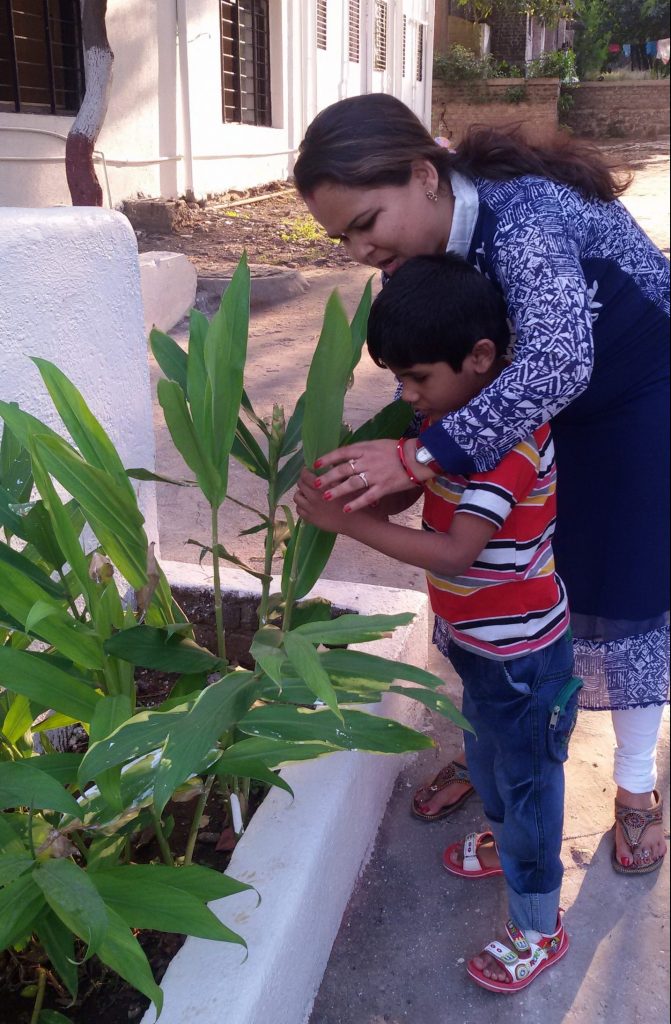
There is very less awareness in India about deafblindness and the challenges this section of society faces. Movies, short films, and social media can play an important role in raising awareness and spreading information on deafblindness to the larger population.
|
Instead of looking at persons with deafblindness in isolation, we need to include them in mainstream society through education, jobs, favourable policies, and public awareness. We can also create widespread awareness about this disability by celebrating their achievements.
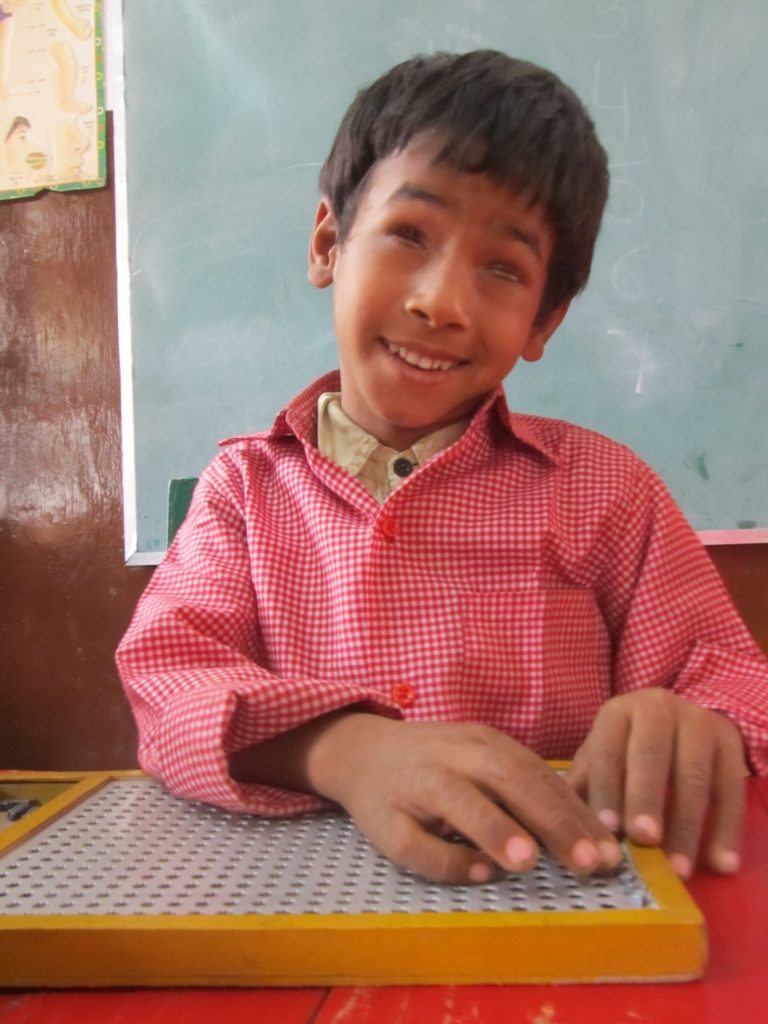 Our advocacy efforts have resulted in several interventions by the Centre and local governments across India.
Our advocacy efforts have resulted in several interventions by the Centre and local governments across India.
- The Rights of Persons with Disabilities Act of 2016 has included deafblindness as a distinct disability and provided special provisions for education, skill development and employment, social security, health, rehabilitation, and recreation.
- A chapter on deafblindness is included in the National Programme on Orientation of Medical Officers Working in Primary Health Centres to Disability Management so medical officers in primary health centres can identify and recommend deafblind cases for rehabilitation.
- The RCI also establishes an Apex Coordination Committee to coordinate, monitor, and evaluate programme implementation at the country level. We developed a Deafblindness module as part of the orientation training of medical officials to treat disability issues connected to deafblindness under this plan.
We have come a long way in the past 25 years. We have had plenty of challenges to get this unique disability recognised, support people with deafblindness to access their rights to live a life of dignity and create awareness that deafblindness is not insurmountable. We still must reach out to many more people with deafblindness. Twenty-five years on, we feel that we have just begun. Come with us on this journey to transform lives.



